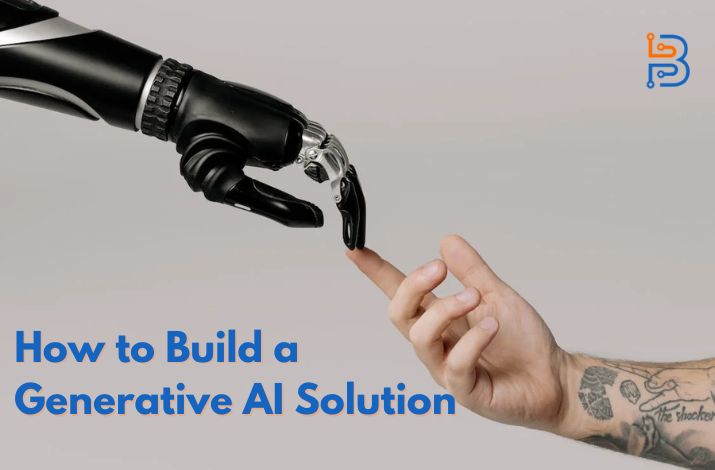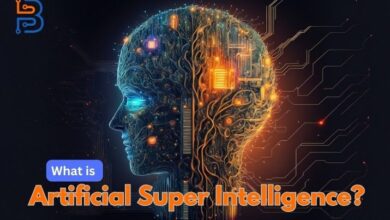Top Use Cases of Generative AI in Healthcare, Finance, and Retail

Generative AI (GenAI) is no longer a theory. It is real, transformative, and quickly changing the landscape for multiple industries. The list goes on and on, from rare disease diagnoses and customer service streamlining to financial report automation; the capabilities of this technology just keep growing.
Especially in Healthcare, finance, and retail, Generative AI development services are revolutionizing the way organizations plan, conduct, connect, and create.
In this post, I will take you through the biggest real-world Generative AI use cases in healthcare, finance and retail.
Let’s start!
Rise of Generative AI
The growth of generative AI is changing many fields, including healthcare, banking, and retail. It is also changing how businesses generate new ideas and serve their customers. Generative AI is being used in healthcare to make fake medical images for training diagnostic models, create personalized treatment plans, and speed up drug development by simulating how molecules interact with each other.
In finance, it can be used to enhance risk assessment models and detect scams, as well as to automate customer service with chatbots that provide complex financial advice. This helps people make decisions faster and runs businesses more efficiently. In retail, generative AI is transforming how inventory is managed, personalizing marketing strategies, and even influencing the creation of unique goods by analyzing customer behavior to predict trends. This is the reason, more and more businesses are investing in Generative AI development services to take their operations and processes to a whole new level.

Generative AI Use Cases
Generative AI in Healthcare: Personalized, Precise, and Proactive
The Generative AI is not only capable of transforming healthcare but also taking it to an unprecedented level. GenAI allows simultaneous synthesis of large volumes of patient records, genomics data, clinical notes, and research literature, which was never possible.
Medical imaging & diagnostics
Generative AI models can create realistic medical images like X-rays, MRIs, and CT scans to supplement training data or recreate rare disease states. This enhances the accuracy of the diagnostic models because when it comes to a rare disease, they are information-hungry.
- Reduces Bias in Datasets AI-generated scans
- Another approach to ensuring diversity in datasets is synthetic data, which fills gaps for populations with limited representation in the existing data.
- It develops radiology systems across the board and not on patient-identifiable data.
Many hospitals and research institutes are utilizing Generative AI technology to automate and streamline radiological workflows to reduce diagnosis time and increase consistency.
Drug Discovery and Molecular Design work
Traditional drug discovery is resource-consuming and takes more than a decade for full-cycle research. By using generative AI models that can design novel molecules with desirable therapeutic properties, the entire discovery pipeline can be accelerated.
- Come up with new-looking compounds that might have certain properties
- Use protein folding simulations to enhance efficacy predictions
- Detecting off-target effects even before clinical trials initiation
However, working with GenAI tools may save pharmaceutical companies R&D timelines in hundreds of millions of dollars and bring life-saving treatments to market quicker.
Personalized Treatment Plans
The other important use case is the establishment of personalized treatment pathways, which are based on patient history, genomics, lifestyle, and disease progression. In processing huge data points and possible therapeutic strategies
- Recommends combinations of drugs and dosage levels
- It predicts how a patient population will respond to a treatment
- Automates follow-up care and monitoring manoeuvres
These AI recommendations are now being incorporated into electronic health records (EHRs) through Generative Artificial intelligence service providers that enable dynamic decision support to clinicians.
Generative AI in Finance: Secure, Smart, and Scalable
Quick adoption of AI in the finance industry for fraud detection, “better with less risk, increased efficiency.” Now you can take it even further, a recent wave of GenAI with its remarkable power of advanced analytics, conversational tools, and process automation has gone where never possible before.
Automated financial reporting and summarization
Artificial intelligence has the potential to automatically analyze financial statements, summarize performance trends, and even generate quarterly or annual reports.
- Prepares earnings reports in a variety of formats and languages
- Underlines any anomalies or risks in real time
- Minimizes manual effort and human error
With the need to adhere to the strict regulatory standards, financial organizations and investment firms have found it easier to adopt the Generative AI systems, as they help them automate the reporting workflows.
Synthetic Data for Risk Modeling
Many risk assessment models require significant amounts of data to be trained appropriately. When data is highly sensitive, such as in sectors such as banking and insurance, GenAI can generate synthetic data that retains statistical properties of the original data to train models while maintaining privacy.
- Imitates customer behaviors and transaction trends
- Allows Stress testing of the edge cases
- Facilitates data augmentation for cases where historical data is scarce
Such an approach based on synthetic data ensures that models are robust and cannot be trained to break compliances such as GDPR or CCPA.
Detecting and Preventing Fraud
Fraudulent behavior frequently exhibits patterns that traditional rule-based methods struggle to detect. When it comes to predictive analytics, GenAI can simulate attacks to identify new, evolving fraud methods, enabling enhanced model learning.
- Forecast possible weaknesses in payment platforms
- Creates additional fraud scenarios for teams to start training systems against, even before a given fraud occurs
- Enhance the precision of alerts and decrease false positives
Bank systems are more adaptive and empowered to stop fraud in real-time, empowered with Generative Artificial Intelligence.
Generative AI For Retail: More Engaging, Efficient, And Insightful
GenAI can supercharge everything from personalization to operational efficiency — the latter is the beating heart of any retail business. The technology is transforming both the way consumers shop and the way brands respond, from virtual try-ons to inventory forecasting and chatbot support.
Personalized Content-Based Privacy Act
Generative AI helps retailers generate hyper-personalized emails, social ads, product recommendations, and more at scale, using customer profiles and behavior.
- Generates automatic subject lines, Product Descriptions, and CTAs
- Localizes content for other languages, regions, or devices
- Customizes messaging to drive an upsell, cross-sell, or re-engagement
The marketers are now relying upon the Generative AI technology to serve personalized content, leading to conversions, stringent churn, and a higher percentage of brand loyalists.
Chatbots and Virtual Assistants
Generative AI enables intelligent retail chatbots that can comprehend and respond to consumer queries with greater context and empathy.
- Taking care of customer service complaints, returns, or queries
- Provides advice on what to stock based on current inventory
- Seamless integration across voice and text platforms (WhatsApp, Messenger)
These AI assistants enhance operational efficiency and provide a human-like customer experience, around the clock!
Forecasting Demand and Optimizing Inventory
Based on past sales observations, seasonal weather, holiday, and social trends, etc., GenAI models can not only predict demand more accurately than conventional methods, but can also recommend reorder timing and bundling scenarios.
- Now, it anticipates which products will go viral and when.
- Prevents stockouts or excess of items
- Dynamic pricing strategies are recommended
Retailers adopting Generative AI development services enable supply chain experience timely response to market dynamics and lower operational losses.
Emerging Use Cases across Industries
With the technology maturing, we are now beginning to see novel and cross-industry applications emerging with Generative AI:
Generating Voice and Video to Build Training
GenAI can power scalable, hyper-personalized training, onboarding, and education content with synthetic avatars and near-natural speech, from multilingual training videos in finance to speech-first, multimodal symptom explainers in healthcare, and more.
Automation for Regulation and Compliance
Some examples of compliance that require 0-dread include the documentation and auditing trail of SOX, HIPAA, or PCI-DSS. These documents are on autopilot, leading to 24×7 compliance, without a single human touch.
Build Interfaces That Are Multilingual and Inclusive
Generative AI can entirely localize interfaces — e.g., an e-commerce store, a patient portal, etc., making services more accessible and inclusive in multiple geographies and demographic segments.
Importance of Generative AI Development Services
What is common across these use cases? A successful GenAI application entails an amalgamation of infrastructure, security, and seamless integration with your legacy systems, and bespoke configurations to suit your business needs— the kind that can only be provided by trusted Generative AI development partners.
- Will normally come with these services:
- Custom GenAI model building and tuning
- Embedding Models into Existing Digital Platforms
- Ensuring Compliance, data security, and data privacy
- Fine-tuning model performance to meet business requirements
- Provides maintenance service, updates, and scaling strategies
No matter you are a hospital administrator, a CFO, or the Head of Retail innovation, selecting the accurate right AI partner is going to form the core of your GenAI success narrative.
Final Thoughts
Generative AI is more than a buzzword, and its use cases in healthcare finance and retail are amazing. A Business Transformation Supercharger. It provides accuracy and individuality to healthcare. It provides scale and security in finance. Business applications provide metrics for hyper-personalized engagement and intelligent inventory decisions in retail.
As highlighted by McKinsey’s report on the economic potential of generative AI, industries that adopt this technology early are likely to see exponential gains in productivity, customer satisfaction, and innovation.
Enterprises implementing reliable Generative AI development services will remain ahead of the curve as adoption grows, with awareness, agility, and consumer satisfaction as the order of the day. The future is generative.






